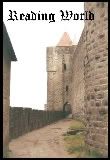I received this book for free from Netgalley. That did not influence this review.
Mary Balogh is one of my favorite historical Romance writers. I’ve been following her A Westcott Novel series since the beginning, seven books ago. The underlying premise is that upon the death of the earl of Riverdale, it was discovered that his marriage had been bigamous. His three children--two daughters and his son (the heir)-- were immediately disinherited and ostracized by the ton. His fortune went to his firstborn, a daughter, who had been raised in an orphanage and then became a teacher there. His entailed properties went to a cousin.
The Westcott family is large and extended. The novels follow the various courtships and marriages of the daughters, the unfortunate wife who was not legally a wife, cousins, aunts, and now, with Someone to Cherish, the disinherited son.
Harry Westcott was twenty years old at the time of his father’s death. He had a couple of weeks to enjoy his new status of earl and head of the family before his world came crashing down. Lost and helpless, he joined the army and fought against Napoleon. He was badly wounded and took years to recover. Now, he lives at an old family estate in the country, Hinsford Manor. His step-sister (the legitimate heiress) owns the property but has essentially given it to him, if he would only take it.
Harry is content with his life, but his family (the whole huge lot of them) worry about him. He’s about to turn thirty and he’s alone. The women decide to throw him a surprise party and do some matchmaking.
The town of Hinsford is small and everyone knows everyone. Harry is treated with all the courtesy and respect that would have been his if he were still an earl. (Although they call him Major instead of milord.) One of the townspeople--Harry’s neighbor, in fact-- is the young widow of the previous vicar. The vicar was a well-regarded zealot who died saving a local youth from drowning. His wife, his helpmeet, is the largely invisible Mrs. Lydia Tavernor. Lydia lived in her husband’s shadow, echoing his good works. She has completed her year of mourning and is beginning to emerge into society. But though she has discovered a few close female friends, she still does her best to remain inconspicuous. It’s difficult being the pious widow of a martyred vicar.
Lydia is determined never to marry again. She’s had enough of overbearing males in her life. But she’s lonely. She wonders what it would be like to take a lover. Specifically, she wonders what it would be like to have an affair with Harry Westcott.
This is not something she would ever act upon. Except, after a quiet evening of cards and music at the home of mutual friends, Harry is prevailed upon to walk her home. They have never had a real conversation before, despite being neighbors, but both enjoy the short walk. As they arrive at her home, a small cottage that she keeps by herself, she asks Harry if he’s ever lonely. Although she doesn’t finish the thought, it’s clear to him what he’s asking and what she’s offering. Nothing happens that night, but he returns the next day to further the friendship, because he is lonely too. Things take their course. Scandal ensues, the culmination coinciding with the arrival of the extended Westcott brood for Harry’s surprise party.
The novel is lovely. The plot unfolds a bit slowly since there is a lot of backstory to cover, largely to catch the reader up on Harry’s family. It’s nice to be reminded of the lot of them, though it would probably be overwhelming (and maybe unnecessary) for readers jumping in here or having jumped in somewhere in the middle. I’d recommend reading the series in order, although it will require a significant investment of time by now.
Harry and Lydia make a fine couple. Harry has a painful past to overcome, but he has made great strides already and finding his own true love is the final step for him. Lydia also has had a difficult past. Her marriage was not what people imagine and it’s a leap of faith to imagine another marriage would be different.
Mary Balogh has a gift for creating sympathetic characters, protagonists to root for, and a large, warm supporting cast. I’ll continue reading about Westcotts as long as she keeps writing about them.


















